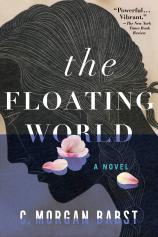Reading Group Guide
Discussion Questions
The Floating World

1. The novel begins with two epigraphs: one from the spiritual “When the Saints Go Marching In” and one from Virgil’s "Aeneid." How did these lines inform your reading of the book? In what ways is the book like a spiritual? An epic poem?
2. Hurricane Katrina touches off the action in this story. Why, then, does the novel begin “Forty-Seven Days after Landfall,” and then dip back to narrate the storm itself 175 pages later? How does the novel’s temporal structure reflect the psychological state of the Boisdorés?
3. Cora is absent, in different ways, throughout the novel. How does her absence affect in the lives of the other characters? How does it pull the story along?
4. The hurricane opens up fissures not only in the levees but in the lives of all of the characters in the novel. What cracks already existed in Joe and Tess’ marriage? In Troy and Reyna’s sibling bond? In Cora’s relationship with her parents? How do disasters unearth pre-existing flaws in our ordinary lives?
5. Which character do you think loses the most in the aftermath of the storm? Why?
6. How have Tess’s coping strategies backfired? Does her behavior make her a bad mother? A bad therapist?
7. Tess believes Joe is passive and weak. Is he? In what ways does he live up to her expectations? In what ways is he forceful and brave?
8. How are self-preservation and compassion at odds in the novel? In a disaster of such magnitude, is it possible to reconcile survival with morality?
9. Del’s relationship with Zach is both more and less intimate than she would like it to be. Why is this? Do you think Del’s fantasy at the end of the book --- “their teenaged children [coming] back from the parades...carrying glittered coconuts in their arms” --- has a chance of coming true?
10. Ultimately Del returns to New Orleans while Cora leaves it. What differences in their personalities account their different trajectories? How have their divergent experiences of the storm caused their paths to diverge?
11. Vincent’s dementia prevents him from fully engaging with the storm and its aftermath. How do his voyages into the more distant past --- to get a pocket pie, to see his wife --- interact with the primary action of the novel. How is his memory loss similar to the losses caused by the hurricane?
12. What is the significance of Vincent’s hope chest in the novel? How is Del’s dedication of herself to cabinetmaking significant?
13. Vincent and Cora both wander through the city. What motivates their wandering? In what ways are these voyages similar or different?
14. Like the hurricane, Reyna’s mental illness and death drive much of the action of the book. What really happened to her? Is Cora in any way correct in thinking that she is responsible for her death? What underlying societal problems triggered this state of affairs?
15. At one point, Reyna says “Help gets you fucked.” Is this just the raving of a madwoman, or do you agree with her? In what ways do the characters’ attempts to help one another wind up hurting? In a disaster like Katrina, what can be expected of the rescuers and the rescued?
16. The chapter titles come from Dante’s INFERNO, Mrs. Randsell is reading a book about the Greco-Roman afterlife, and Cora is often described as a ghost or a corpse. In what way is Cora’s experience of the flood like a descent into hell? How is her resurrection accomplished?
17. Evacuation catalyzes many of the novel’s events. Is it braver to hold your ground in the face of a disaster or flee? As coastal cities are increasingly threatened by storms and rising tides, when is the right time to leave?
18. Trauma --- whether caused by natural or man-made disasters --- can trap us in a dangerous spiral, in which we can fail to truly escape the past. What are some strategies for moving on from tragedy? How can we begin to rebuild in the aftermath of a disaster?
The Floating World
- Publication Date: October 2, 2018
- Genres: Fiction
- Paperback: 400 pages
- Publisher: Algonquin Books
- ISBN-10: 1616208635
- ISBN-13: 9781616208639








